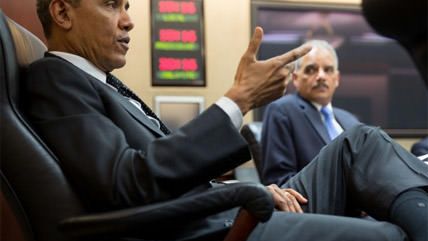The Surveillance State Lives
In sizing up Obama's "reforms" of the indiscriminate gathering of data on every American, remember this: Politicians will do everything they can get away with in pursuit of their own agenda.

President Obama has some nerve. He opened his speech on NSA spying by likening his surveillance regime to Paul Revere and the Sons of Liberty. How insulting! They were helping people resist government tyranny, and the British spied on them to put down the coming rebellion.
In sizing up Obama's "reforms" of the indiscriminate gathering of data on every American, remember this: Politicians will do everything they can get away with in pursuit of their own agenda. To them, liberty and privacy are unimportant, things to be gotten around with the minimum of public attention. Should the public get wind of some untoward thing the politicians are up to — as it did, thanks to Edward Snowden — they will put on a public-relations show to lull the people back to sleep, enabling the state once again to go about its unsavory business unobserved.
That is what's happening here. As Glenn Greenwald aptly put it, Obama's "defining value to the permanent power factions that run Washington" is that he "prettifies the ugly; he drapes the banner of change over systematic status quo perpetuation; he makes Americans feel better about policies they find repellent without the need to change any of them in meaningful ways. He's not an agent of change but the soothing branding packaging for it."
Thus, the appropriate attitude toward the so-called reforms is deep skepticism. You want evidence? Obama expressed confidence "in the integrity of those who lead our intelligence community." He has apparently forgotten that the director of national intelligence, James Clapper, told a boldfaced lie to a Senate committee when he said "No, sir" to this question from Sen. Ron Wyden: "Does the [NSA] collect any type of data at all on millions or hundreds of millions of Americans?" (Clapper later explained that this was the "least untruthful" answer he could give.) Obama's spokesman said the president "certainly believes that Director Clapper has been straight and direct in the answers he's given."
Obama's own veracity must also be questioned. In his speech he said that when he was a senator he was critical of the George W. Bush administration's warrantless eavesdropping. But if that's true, why did he vote for the 2008 FISA law, which, as Greenwald notes, "legalized the bulk of the once-illegal Bush program"?
To the extent Obama has become more favorable to surveillance since the Bush years it's apparently because, as a former aide told the New York Times, "he trusts himself to use these powers more than he did the Bush administration."
In light of this flagrant disregard for the truth and willingness to bamboozle the people, why should anyone take Obama's "reforms" seriously? He promises mostly executive-branch safeguards — created by Clapper and Attorney General Eric Holder — but in the end, this will be little more than window dressing to regain public trust. There are always emergency escape clauses.
To be sure, Obama is clever. He says,
Given the unique power of the state, it is not enough for leaders to say: Trust us, we won't abuse the data we collect. For history has too many examples when that trust has been breached. Our system of government is built on the premise that our liberty cannot depend on the good intentions of those in power; it depends on the law to constrain those in power.
But "the law" can't constrain those in power, because the law is always interpreted and enforced — or not enforced — by those very people in power. Ultimately, government officials define their own powers. Checks and balances mean that one part of the state monitors another part. It's hard to muster confidence in such a weak safeguard.
Obama says we need surveillance to protect us from terrorists. But we could be safe without having our freedoms trampled if the government would stop committing and enabling oppression in foreign countries, thus creating the desire for revenge against Americans.
Freedom and security require no trade-off, because genuine freedom includes security against government snooping. Obama asks for trust, but we have too much experience to grant him his wish. Yet even if government officials had pure motives, they still should not be trusted with the power to spy.
This column originally appeared on the Future of Freedom Foundation.


Show Comments (27)